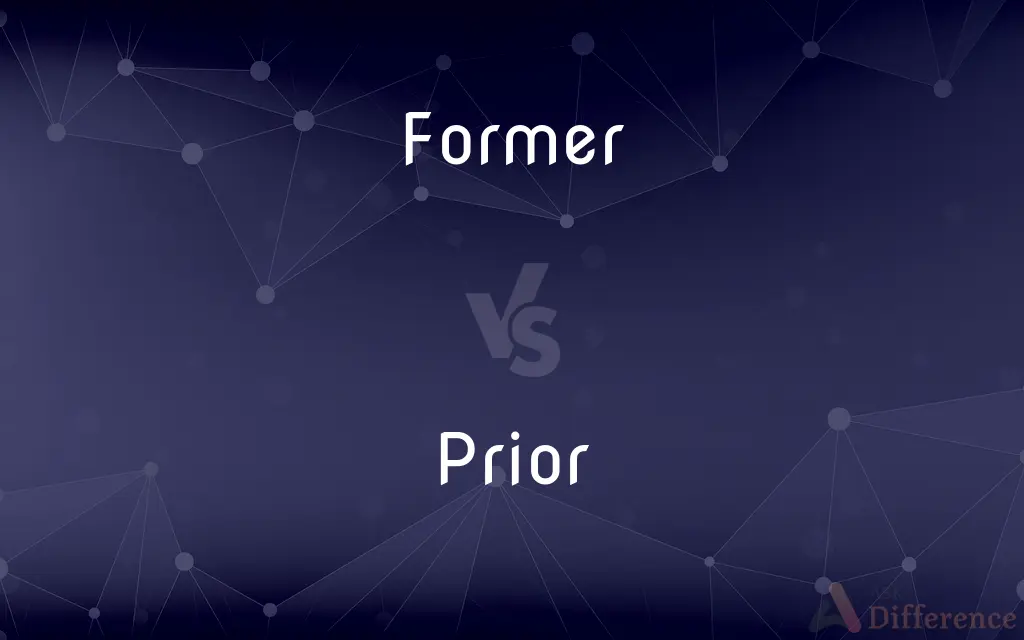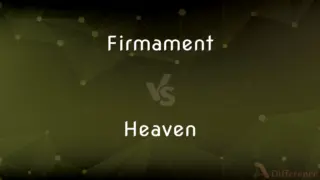Former vs. Prior — What's the Difference?
Edited by Tayyaba Rehman — By Urooj Arif — Updated on April 3, 2024
"Former" refers to the first of two things mentioned; "prior" implies something preceding in time.

Difference Between Former and Prior
Table of Contents
ADVERTISEMENT
Key Differences
"Former" and "prior" are terms often used to indicate precedence, but they serve different linguistic functions and contexts. "Former" specifically refers to the first of two (or more) things mentioned in a sequence. It is used to distinguish between two elements, emphasizing their order in mention or occurrence. On the other hand, "prior" denotes something that happened before another event or time period, without the necessity of a direct comparison between two specific entities.
In usage, "former" is often employed in discussions or writings to clarify the position or order of items or individuals. It serves to highlight a sequence or to make a distinction between two mentioned aspects, emphasizing the one that comes first. For example, when comparing two past presidents, "former" would identify the one mentioned first. Conversely, "prior" is used to indicate a precedence in time, suggesting that the event or condition it describes occurred before another stated or implied time or event. It is more temporal in nature and less about positional order between two entities.
The contexts in which "former" and "prior" are used also differ. "Former" is typically found in narratives, discussions, or descriptions that involve a clear sequence or a need to distinguish between two previously mentioned subjects. It is relational and specific to the order of mention. "Prior," however, is broader, often used in legal, historical, or procedural texts to denote precedence in time, not necessarily tied to a sequence of mention but rather to temporal succession.
Despite their differences, both "former" and "prior" share a commonality in indicating some form of precedence, whether in order or time. This shared aspect underlines their utility in providing clarity and precision in communication, ensuring that readers or listeners understand the exact relationship in terms of sequence or timing.
"Former" aligns more with distinguishing between elements in a narrative or descriptive context, helping to clarify positions or roles based on the order of mention. "Prior" leans towards a temporal precedence, crucial in contexts that require an understanding of time-based sequences or hierarchies, such as historical accounts, legal frameworks, or procedural guidelines.
ADVERTISEMENT
Comparison Chart
Definition
Refers to the first of two things mentioned.
Denotes something that happened before another in time.
Usage Context
Used to distinguish between two entities based on sequence.
Indicates temporal precedence without direct comparison.
Typical Use
In narratives or when specifying order of mention.
In historical, legal, or temporal contexts.
Nature
Positional and sequential.
Temporal and chronological.
Example Scenario
"The former president, unlike his successor..."
"Prior to the 19th century, this practice was common..."
Compare with Definitions
Former
Used to clarify when two entities are mentioned.
Between coffee and tea, I prefer the former.
Prior
Indicates a historical sequence without direct comparison.
Prior studies have shown similar results.
Former
Indicates the first in a sequence of two or more items.
In the debate between freedom and security, I lean towards the former.
Prior
Can be used without mentioning a second entity.
She had decided on this course of action prior to the meeting.
Former
Effective in texts that compare two entities.
The former method proved more efficient than the latter.
Prior
Refers to events or conditions occurring before others.
Prior to his current role, he worked in marketing.
Former
Helps in distinguishing roles or positions in stories.
The former CEO was known for his innovative strategies.
Prior
Often found in contexts that emphasize time-based criteria.
Prior approval is required for any changes.
Former
Contextually tied to the position in a listed or mentioned order.
Of the two suggestions, the former was adopted.
Prior
Suggests a broader temporal framework rather than immediate succession.
His experience was gained in the years prior to joining the company.
Former
A former is an object, such as a template, gauge or cutting die, which is used to form something such as a boat's hull. Typically, a former gives shape to a structure that may have complex curvature.
Prior
Prior (or prioress) is an ecclesiastical title for a superior, usually lower in rank than an abbot or abbess. Its earlier generic usage referred to any monastic superior.
Former
One that forms; a maker or creator
A former of ideas.
Prior
Preceding in time or order
“[They] insist that foreign vessels seeking access obtain prior approval” (Seymour M. Hersh).
Former
A member of a school form
A fifth former.
Prior
Preceding in importance or value
A prior consideration.
Former
The first of two persons or things mentioned
"The army was pulling itself together, the government was coming apart. The success of the former was continually imperiled by the failure of the latter" (Garry Wills).
Prior
Usage Problem Before.
Former
Relating to or taking place in the past
In former times.
Prior
A previous conviction or arrest
The suspect has two priors.
Former
Having been so in the past
A former ambassador.
His former boss.
Prior
A monastic officer in charge of a priory or ranking next below the abbot of an abbey.
Former
Being the first of two mentioned.
Prior
One of the ruling magistrates of the medieval Italian republic of Florence.
Former
Previous.
A former president;
The former East Germany
Prior
Advance; previous; coming before.
I had no prior knowledge you were coming.
Former
First of aforementioned two items. Used with the, often without a noun.
The former is a good idea but the latter is not.
We have two cars, a red one and a blue one. We won the former on a game show.
Prior
Former, previous.
His prior residence was smaller than his current one.
Former
Someone who forms something; a maker; a creator or founder.
Dave was the former of the company.
Prior
(colloquial) Previously.
The doctor had known three months prior.
Former
An object used to form something, such as a template, gauge, or cutting die.
The brick arch was built using a wooden former.
Prior
A previous arrest or criminal conviction on someone's record.
Former
Someone in, or of, a certain form (class).
Prior
A prior probability distribution, one based on information or belief before additional data is collected.
Former
One who forms; a maker; a creator.
Prior
A belief supported by previous evidence or experience that one can use to make inferences about the future.
Former
A shape around which an article is to be shaped, molded, woven wrapped, pasted, or otherwise constructed.
Prior
A high-ranking member of a monastery, usually lower in rank than an abbot.
Former
Preceding in order of time; antecedent; previous; prior; earlier; hence, ancient; long past.
For inquire, I pray thee, of the former age.
The latter and former rain.
Prior
(historical) A chief magistrate in Italy.
Former
Near the beginning; preceeding; as, the former part of a discourse or argument.
Prior
Preceding in the order of time; former; antecedent; anterior; previous; as, a prior discovery; prior obligation; - used elliptically in cases like the following: he lived alone [in the time] prior to his marriage.
Former
Earlier, as between two things mentioned together; first mentioned.
A bad author deserves better usage than a bad critic; a man may be the former merely through the misfortune of an ill judgment; but he can not be latter without both that and an ill temper.
Prior
First, precedent, or superior in the order of cognition, reason or generality, origin, development, rank, etc.
Former
The first of two or the first mentioned of two;
Tom and Dick were both heroes but only the former is remembered today
Prior
The superior of a priory, and next below an abbot in dignity.
Former
Referring to the first of two things or persons mentioned (or the earlier one or ones of several);
The novel was made into a film in 1943 and again in 1967; I prefer the former version to the latter one
Prior
A chief magistrate, as in the republic of Florence in the middle ages.
Former
Belonging to some prior time;
Erstwhile friend
Our former glory
The once capital of the state
Her quondam lover
Prior
A prior conviction; - said of an accused criminal.
Former
(used especially of persons) of the immediate past;
The former president
Our late President is still very active
The previous occupant of the White House
Prior
The head of a religious order; in an abbey the prior is next below the abbot
Former
Of the distant past;
The early inhabitants of Europe
Former generations
In other times
Prior
Earlier in time
Common Curiosities
Can "prior" and "former" be used interchangeably?
Not typically, as they serve different purposes in indicating temporal precedence and order of mention, respectively.
How do "former" and "prior" relate to time?
"Former" relates to sequence order, while "prior" specifically denotes chronological precedence.
Is "former" only used for people?
No, it can refer to any entities or items mentioned in a sequence.
Do "former" and "prior" have synonyms?
Yes, but their synonyms also carry specific connotations; for example, "previous" might be closer to "prior," and "earlier" can align with either based on context.
Why is the distinction between "former" and "prior" important?
It helps in providing clarity and precision in descriptions and narratives, especially in formal or academic writing.
What is the main difference between "former" and "prior"?
"Former" refers to the first of two mentioned items, while "prior" indicates something occurring before another in time.
Can "prior" be used without mentioning what it precedes?
Yes, it often indicates a general timeframe or condition before another event.
Is one more specific than the other?
"Former" is more specific when referring to the order of two mentioned items, while "prior" provides specific temporal precedence.
What's the role of these terms in academic writing?
They are crucial for clarity, especially in analyses, discussions, and historical accounts.
Is "prior" more formal than "former"?
It's not necessarily more formal, but "prior" is often used in legal, historical, and procedural contexts.
How does context affect the choice between "former" and "prior"?
The choice depends on whether the emphasis is on order of mention ("former") or temporal sequence ("prior").
Can the use of "former" and "prior" change the meaning of a sentence?
Yes, because they direct the reader's attention to different aspects of time or sequence, potentially altering the intended emphasis or clarity.
Can these terms be used in all types of writing?
Yes, but their appropriateness varies with the context and clarity required by the text.
How do "former" and "prior" impact narrative structure?
They help organize information either by order of mention or by historical sequence, aiding in the reader's comprehension.
How do "former" and "prior" contribute to language precision?
By allowing writers to specify the order or timing of events and entities, enhancing understanding and accuracy.
Share Your Discovery

Previous Comparison
Firmament vs. Heaven
Next Comparison
Intellect vs. MindAuthor Spotlight
Written by
Urooj ArifUrooj is a skilled content writer at Ask Difference, known for her exceptional ability to simplify complex topics into engaging and informative content. With a passion for research and a flair for clear, concise writing, she consistently delivers articles that resonate with our diverse audience.
Edited by
Tayyaba RehmanTayyaba Rehman is a distinguished writer, currently serving as a primary contributor to askdifference.com. As a researcher in semantics and etymology, Tayyaba's passion for the complexity of languages and their distinctions has found a perfect home on the platform. Tayyaba delves into the intricacies of language, distinguishing between commonly confused words and phrases, thereby providing clarity for readers worldwide.














































